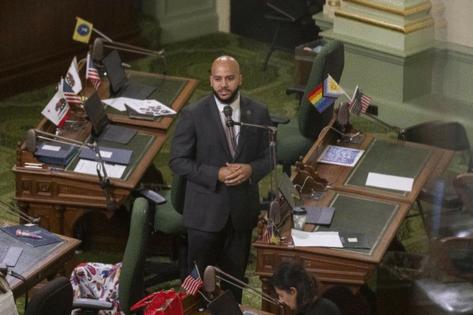Social media, ICE, antisemitism bills head to Gov. Newsom's desk
Published in News & Features
Lawmakers charged through dozens of bills as the legislative session neared a close late Friday night, and had to reconvene Saturday to pass a wide-ranging climate and energy deal that came through late in the week.
The deadline to pass the legislation forced action on bills to regulate artificial intelligence, reign in immigration enforcement and require housing near transit. The final frenzy brought scores of lobbyists to the Capitol, and in the Assembly lawmakers walked the aisles with “vote cards” to be sure they had enough support to pass their bills.
Here are some of the major pieces of legislation that lawmakers sent to Gov. Gavin Newsom’s desk. Newsom has until Oct. 12 to sign or veto the bills. If he takes no action, they will go into effect.
Responding to Immigration and Customs Enforcement
Senate Bill 627 would prohibit law enforcement on the local, state and federal level from wearing masks that conceal their identity in the course of duty. The bill was introduced in June following targeted arrests by ICE of undocumented people in Los Angeles, and faced opposition from Republicans and police officers, who argued it was too broad and would lead to officers being doxxed, or having their personal information released online. There are also possible legal challenges about state laws pertaining to federal officers.
“If we want the public to trust law enforcement, we cannot allow them to behave like secret police in an authoritarian state,” said author state Sen. Scott Wiener, D-San Francisco.
Education
Assembly Bill 715 was the only priority bill of the California Legislative Jewish Caucus, aiming to address antisemitism in California public schools that authors have argued has become worse in recent years, as the war between Israel and Hamas continues in Gaza. In its current form, the bill creates an Office of Civil Rights and an Antisemitism Prevention Coordinator to work with educators to “proactively prevent antisemitism.” It was significantly scaled back from an earlier version, which was opposed by a large coalition of advocacy groups.
Assembly Bill 7 would allow public universities in California to consider giving admissions preference to applicants who are descendants of American chattel slavery. Supporters, including the author, Isaac Bryan, D-Jefferson Park, argue that just as legacy admissions are prioritized, a lineage of slavery should also be considered. Opponents to the policy, including the anti-affirmative action group Californians for Equal Rights Foundation, have argued it violates Proposition 209, the 1996 California law that prohibits race-based admissions. Bryan has argued that “lineage” is separate from “race” as an admissions consideration.
Artificial intelligence/social media
Assembly Bill 56 would require social media companies that know their users are younger than 17 to show them a black box warning for at least 10 seconds that tells them, in part: “social media is associated with significant mental health harms and has not been proven safe for young users.” After three hours of continuous use, the warning would reappear, for 30 seconds. The bill was scaled back from an earlier iteration, which required warnings for adults too.
Senate Bill 53 is the second try of author state Sen. Scott Wiener, D-San Francisco, to regulate the artificial intelligence industry. The scaled-back version of last year’s sweeping effort would require AI companies with the most advanced technology to have safety and security frameworks in place, protect whistleblowers and allow the public to report safety incidents to the Attorney General. Official opposition included the business interest groups CalChamber, Computer & Communications Industry Association and TechNet. Behind the scenes, AI giant Anthropic was in favor, and OpenAI was opposed, according to Assemblymember Bauer-Kahan, D-Orinda.
Assembly Bill 1064, also called the Leading Ethical AI Development (LEAD) for Kids Act, would prohibit anyone from making a companion chatbot that could foreseeably “harm a child, including encouraging the child to engage in self-harm, suicidal ideation, violence, consumption of drugs or alcohol, or disordered eating.” Representatives for the tech industry were opposed, and pitted it against AI companion chatbot regulation bill Senate Bill 243, which was watered down in the last days of the session.
Policing
Assembly Bill 1108 would remove the ability for a sheriff-coroner to determine the cause of an in-custody death. In 48 of California’s 58 counties, the two offices of sheriff and coroner are combined, leading to questions about impartiality in officer-involved deaths. It would require counties where those offices are combined to contract with a different county or a private third-party medical examiner to determine the cause of death.
Housing
Senate Bill 79 would require communities to approve more housing developments near train and bus stations in many counties across the state. Hundreds of “Yes in My Backyard” pro-housing groups and a number of progressive cities registered support, and hundreds of cities from around the country registered opposition. The measure passed in a close vote after a series of changes as Wiener, its author, gathered enough support.
_____
©2025 The Sacramento Bee. Visit sacbee.com. Distributed by Tribune Content Agency, LLC.







Comments